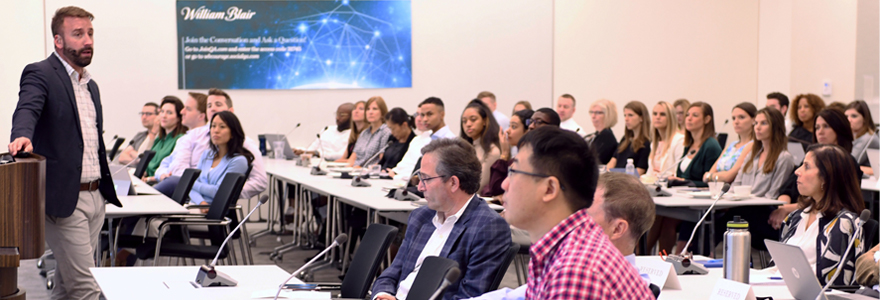
Communications expert Scott Zimmer entertained William Blair staff on the virtues of bridging generation gaps in the workplace at the firm's continuing Courageous Conversations learning series on July 31.
Addressing an overflow audience at Chicago headquarters, Zimmer drew questions and laughter as he outlined many examples of the trip wires or stereotypes that can show up between younger and older employees of the same organization. Those can affect how different generations look at the same situation or try to solve the same problem.
For starters, "Yo" is not the best greeting to use in formal business communications, Zimmer said to laughter.
Zimmer, who works with Minneapolis-based BridgeWorks, identified himself as a "proud GenXer." But using his experience as a business consultant, he identified different age groups in terms the audience immediately understood.
He suggested four traits defining Baby Boomers (born 1946-1964) were: idealist, disciplined, competitive, polished. Zimmer described Generation X (born 1965-1979) as resourceful, efficient, skeptical, independent; Millennials (born 1980 to 1995) as collaborative, innovative, adaptable, experience-driven; Generation Z (born 1996-2010) as industrious, risk-averse, pragmatic, inquisitive.
Zimmer, who grew up in the '80s and '90s, underscored research that showed what happens during one's teen years—from music to world events to pop culture —"has a profound and lasting impact on how we turn out to be."
Formative years, fond memories
For Boomers, such forces included Vietnam, Beatlemania, and a general anti-establishment youth moment that influenced music, art, fashion, and cultural norms. GenXers experienced the launch of MTV but also cultural skepticism amid a rising divorce rate, scandals like Enron, Whitewater, and the O.J. Simpson trial. Millennials, a post 9/11 generation immersed in Harry Potter, absorbed a tech revolution that flowed from cell phones to the internet to social media. GenZ grew up in this ‘smart tech' world with the temptation of answers always at their fingertips.
"During your formative years what was the hot new tech? Was it a transistor radio or an iPhone?" he asked the gathering. "That's going to have an impact on how you interact with technology today."
Often life-long communications habits stem from our formative years. For example, Boomers were raised to use the land-line phone.
"If you were going to answer the phone, every house had rules," he added. "You learned etiquette. You learned to be professional at the age of 10."
Xers had to adapt to the arrival of fax machines, pagers, voice mail, and answering machines. Millennials created a new way of communicating via AOL and Instant Messenger. GenZs were raised on smartphones during their teens and don't think twice about learning life skills, everything from tying a bow tie to unclogging the kitchen sink, on YouTube.
"Four different generations coming up with four different ways of communicating can lead to some frustration, some confusion," said Zimmer.
He advised keeping such specific generation gaps top of mind when colleagues connect with different generations at work.
Zimmer said Boomers value face-to-face communications. Xers prefer sticking to essentials, communicating with direct, one-word answers in emails, for example. Millennials, with social media skills second nature, are used to stripping away formalities in conversations they see as more authentic. Words like "Yo" pop up in texts and sometimes even in formal business communications. Gen Z, he added, responds best to direct and clear communications.
"Working across generations, making sure we all work in an environment where everyone feels respected is not about old versus young or right versus wrong," Zimmer said. "It's about understanding that each and every generation at William Blair is bringing something different and valuable to the table. It's up to us to continue to find ways to tap into that.
"At the end of the day, generations have more in common than not."

Courageous Conversations nurture inclusivity
Zimmer gave the seventh talk in the Courageous Conversations series. The talks, sponsored by William Blair's Alliance Board, were launched in 2018 to nurture an inclusive culture. Zimmer's message of connecting generations resonated with the audience which has seen the firm expand significantly in recent years. With that growth, there has been a major generational shift.
William Blair's head of HR Jami Waggoner, who gave the opening remarks, said just under 1,500 employees work at the firm today—a 57% increase since 2008. Of that, 52% are Millennials and GenZs. The remainder are Baby Boomers and GenX.
"We all have different technical skills, different communications styles, different values, different expectations," she added. "Creating that common denominator to connect generations is all about finding similarities."
William Blair CEO John Ettelson wrapped up the event with a reminder to staff that the Courageous Conversations series was created to nurture an inclusive and respectful workplace, a core value of William Blair.
"As we build the business, we need to understand and appreciate and get different perspectives if we are going to be successful," said Ettelson, adding that he values the lessons he learns every day from staff, many of who are not from his Boomer generation.
In closing, Ettelson drew laughter as he thanked the crowd for attending but then quickly caught himself, adding: "I guess I should say Yo thanks!"


